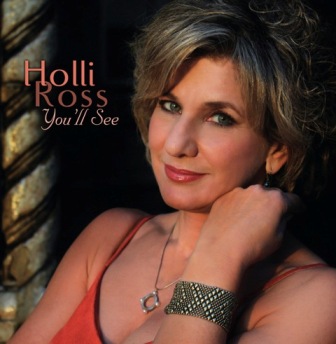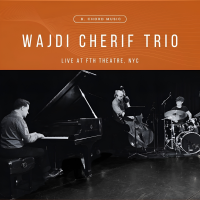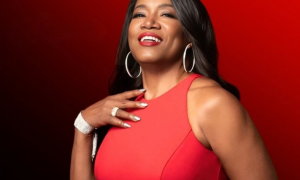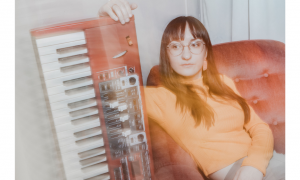
Acclaimed Vocalist, Best Known for her Work with String of Pearls, Joined by A-List of Players: Rufus Reid, Ted Rosenthal, Matt Wilson, Claudio Roditi, and Dennis Wilson
After two decades of ensemble performance, which has won her exceptional critical acclaim, vocalist Holli Ross has taken a step outside of the ensemble format to release her first solo CD. You'll See, a collection of thirteen tracks on which she's joined by such lauded musicians as Claudio Roditi, Dennis Wilson, Matt Wilson, Rufus Reid and Ted Rosenthal, will be released on Miles High Records on October 18.
You'll See offers up Ross' outstanding interpretations of compositions by songwriters as diverse as Laura Nyro, Oscar Pettiford, Duke Ellington and Peggy Lee, as well as three songs newly crafted by Ross in collaboration with Reid and Roditi.
The CD opens with Ross' take on Laura Nyro's iconic “Wedding Bell Blues," which appears here as a ballad, quite unlike the shuffle groove tempo set by the 5th Dimension on that group's 1969 #1 hit single version. “Laura Nyro's songs have always been easily accessible to those of us that like to sing and play (in my case the guitar)," explains Ross. “I would sit for hours and work out what I heard her play on piano. The chords were jazzy and there was a lot of vamping so there was plenty of room for you to do your 'Laura' thing. Those were the days when I'd learn every nuance and breath of a song in hopes of becoming like her. That's what you do at the age of 13. Eventually you realize that you are you and take it somewhere else. Still, her songs are a part of my musical make up during those impressionable years."
Ross' rich vocals and strong scatting on pianist Ted Rosenthal's arrangement of the Dorothy Fields/Jerome Kern classic “Pick Yourself Up"—which has been recorded by such stellar artists as Ella Fitzgerald, Frank Sinatra, Nat King Cole and Diana Krall—mark the tune as uniquely her own, a feat Ross manages to accomplish throughout a CD that also includes Comden/Green/Bernstein's “Lucky to be Me;" Duke Ellington's “Do Nothing Til You Hear From Me" (which has been interpreted by a diverse array of vocalists ranging from Billy Holiday to Sammy Davis, Jr., Gladys Knight and Suzy Boggess); “If I Only Had a Heart," stamped indelibly by the Tin Man in the Wizard of Oz; and Carroll Coates' “You'll See."
“I first heard 'Tricotism' on an Oscar Peterson recording with Ray Brown," recollects Ross. “Although I'd been writing vocalese-type of lyrics (having been strongly influenced by Jon Hendricks) I had no desire to change this tune into a song. It was so effective as it was and having no lyric just wasn't going to stand in my way since I was sold on scatting through the line anyway." Ross pairs with Reid in a spare duet on the bassist's tune, a format she also explores elsewhere on You'll See.
“Many years ago I was strongly influenced by Sarah Vaughan's How Long Has This Been Going On," continues Ross. “On that album, she featured each member of the rhythm section (Oscar Peterson, Ray Brown, Louis Bellson) by performing solely with them on one number. Over the years I've often experimented with duo work and carefully chose songs for this CD that I felt could work in those settings. On 'Tricotism,' I'm able to fulfill one of my 'Sarah' dreams and perform in a duo setting with simply voice and bass."
Ross penned the lyrics to Reid's composition, “Elegy," with her String of Pearls cohort Jeanne O'Connor. “When I first heard 'Elegy,' Rufus was performing with Akira Tana in their band, TanaReid. Jeanne and I turned to each other and simultaneously said, 'This would be a great song!' We approached Rufus, who agreed to let us attempt a lyric. I wrote most of the first chorus and Jeanne wrote most of the second and to our credit, it suited Rufus' sentiment for the song, which he wrote in memory of Sam Jones. It was a no-brainer to feature Rufus up front on his beautiful composition," she explains.
Trumpet great Claudio Roditi was Ross' co-writer for the CD's two other original compositions, the Brazilian flavored “Forty Three After," and the gently swinging “Café Suite." “Claudio and I began to get together to have sessions in which he'd play a composition for me and give me a lead sheet on it. We'd discuss the title (if there was one) and the sentiment in which the tune was written," says Ross to describe their way of collaborating. “I often think of lyric writing as a puzzle. The pieces are all there, you just have to figure out how to put them all together. The challenge was to write lyrics that suited the kicks and hits of the melody and could be sung with a natural feel and still tell the story in a touching or clever way. I just love it when I bring a finished lyric back to him and he says, “Wow, I didn't expect you to do that!" Café Suite was such a coup."
Over the last several decades, Holli Ross—jazz vocalist, music educator, and voice specialist—has been a vibrant force in the jazz world. Alongside her career as co-founder and member of the celebrated vocal trio String Of Pearls (25 years and counting), Ross has garnered fans and praise as a swinging, intensely musical solo singer with a deep knowledge of the jazz tradition.
A native of Long Island, New York, Ross was fortunate to grow up in a musical household, and soon took it upon herself to pursue similar aspirations. “I was a concert brat and just adored seeing my bassoonist father perform in Carnegie Hall," says Holli. Musical theater also had a strong hold at home, so by the time Holli discovered jazz, much of the Great American Songbook repertoire was already firmly lodged in her brain. It just took the final puzzle piece of hearing Ella for the first time to jolt Ross into a lifelong journey through jazz.
Ross has gone on to make a name for herself as an ensemble singer, most notably with String of Pearls, the female vocal trio (with Jeanne O'Connor and Sue Halloran) that started it all for her. The group has amassed a total of four recordings: two released in Japan on the Alpha label (New York—Brazil 1 and New York—Brazil 2) and two stateside (Gems and Brazilian Jewels, the latter a compilation of their two Japanese recordings, on Perldisc). Ross' toolbox of musical skills served her well as this charming trio built its repertoire of vintage and contemporary jazz.
She painstakingly transcribed many of the group's retro arrangements by the likes of the Boswell and Andrews Sisters. She also arranged some songs for the group, and became the primary conductor for the Pearls' backup rhythm section. Her unique vocal gifts—a strong sense of rhythm and swing, a versatile voice that can move from joyous belting to hushed or lush tones, and an instinctive ability to blend with other voices—are particularly suited to singing in a jazz ensemble.
In 1985, Ross received a call from D.C. musician Rick Harris, who was putting together a vocal jazz quartet heavily influenced by Lambert, Hendricks & Ross, Manhattan Transfer, and The Bobs. Rick's brilliant and witty arrangements raised the bar considerably for Ross, as did the high musicality of the other members of Mad Romance, as the group was known. They performed at major jazz clubs and festivals, and released a self-titled recording, before disbanding in 1990. Even while she continued to maintain a steady performance schedule with SOP, Ross joined Group 5, another vocal group made up of NYC's top commercial jingle singers. With Group 5, Ross sang and recorded arrangements by Mike Abene, Don Sebesky, and Bill Mays as part of a project with Peter Nero and the Philadelphia Pops.
Ross has moved beyond solo and ensemble singing to work as a lyricist, jazz educator and most recently a speech therapist specializing in voice disorders. In 2007, Darmon Meader of the New York Voices recommended Ross to be the musical director of the jazz vocal ensemble at Montclair State University, a position she holds to this day. She is also on the jazz faculty at Hofstra University.
Early on in her teaching career, Ross noted that it was not uncommon for a freshman voice student to appear in her studio with inherent vocal problems. This prompted Ross to earn a Masters degree in speech-language pathology.
As a lyricist, Ross was strongly encouraged by the late Ray Passman, who had heard her perform some self-penned vocalese, to develop her natural ability to write witty and dexterous words to jazz compositions. Soon Ross began writing words to such jazz compositions as Miles Davis' “Boplicity" and Roger Kellaway's “Step Right Up," as well as tunes by more contemporary composers, including Harold Danko, Ivan Lins, Bill Mays, Roberto Menescal, and Mal Waldron. One of her favorite lyrics is set to “I Have Waited So Long," a little-known Sarah Vaughan composition that was recently recorded by Janis Siegel and the Count Basie band under the direction of trombonist Dennis Wilson. Another of Ross' idols, Mark Murphy, was inspired to record her “Boplicity" lyric, titled “Bebop Lives." Along the way, Ross also developed a passion for Brazilian and Latin music; Afro-Cuban and Brazilian songs are now an indispensable part of her solo repertoire. A vote of confidence came from Brazilian trumpeter Claudio Roditi who, after performing with Ross at one engagement, approached her to say he liked the way she sang bossa nova and asked if she also wrote lyrics. Together they've gone on to write a half dozen songs, two of which are featured on You'll See, with Roditi on trumpet.
Ross, reviewed as the “the voice of experience" by the late jazz critic Stuart Troup, has shared the stage and studios with many jazz luminaries: Gene Bertoncini, Bill Charlap, Jon Faddis, Bill Mays, Jack MacDuff, Darmon Meader, Hendrik Meurkens, Bucky Pizzarelli, Randy Sandke, Rufus Reid, Claudio Roditi, Ted Rosenthal, Akira Tana, Dennis Wilson, and Matt Wilson. She has toured nationally and abroad with String of Pearls, including high-profile performances at the JVC Jazz Festival, the 92nd Street Y, Town Hall, and the Kennedy Center.
Although the release of You'll See does mark another milestone in Ross' already stellar career, she prefers to view the project as purely adding yet another dimension to her muli-faceted achievements. “As a soloist you can concentrate on the textures hat you create against another instrument or a group of instruments. The lyric must be complimented within the snap decisions of the spontaneity of the performance, while as an ensemble singer your main responsibility is to blend with the other singers," Ross continues, “An ensemble singer's parts are pre-arranged with little room for spontaneity, while a soloist has more leeway, freedom, and expression. Being an ensemble singer is much harder in some ways, yet soloists are hanging out there to dry all by themselves. That being said (and hoping all my soloist friends will not be offended), I still consider myself an “ensemblist" when I perform with a rhythm section. Sure I'm the featured soloist but I'm part of an ensemble and I think of myself as a horn. I just get the extra benefit of expressing lyrics that enhance the musical message. It's an extra gift that singers get to sing both melody and words."
After two decades of ensemble performance, which has won her exceptional critical acclaim, vocalist Holli Ross has taken a step outside of the ensemble format to release her first solo CD. You'll See, a collection of thirteen tracks on which she's joined by such lauded musicians as Claudio Roditi, Dennis Wilson, Matt Wilson, Rufus Reid and Ted Rosenthal, will be released on Miles High Records on October 18.
You'll See offers up Ross' outstanding interpretations of compositions by songwriters as diverse as Laura Nyro, Oscar Pettiford, Duke Ellington and Peggy Lee, as well as three songs newly crafted by Ross in collaboration with Reid and Roditi.
The CD opens with Ross' take on Laura Nyro's iconic “Wedding Bell Blues," which appears here as a ballad, quite unlike the shuffle groove tempo set by the 5th Dimension on that group's 1969 #1 hit single version. “Laura Nyro's songs have always been easily accessible to those of us that like to sing and play (in my case the guitar)," explains Ross. “I would sit for hours and work out what I heard her play on piano. The chords were jazzy and there was a lot of vamping so there was plenty of room for you to do your 'Laura' thing. Those were the days when I'd learn every nuance and breath of a song in hopes of becoming like her. That's what you do at the age of 13. Eventually you realize that you are you and take it somewhere else. Still, her songs are a part of my musical make up during those impressionable years."
Ross' rich vocals and strong scatting on pianist Ted Rosenthal's arrangement of the Dorothy Fields/Jerome Kern classic “Pick Yourself Up"—which has been recorded by such stellar artists as Ella Fitzgerald, Frank Sinatra, Nat King Cole and Diana Krall—mark the tune as uniquely her own, a feat Ross manages to accomplish throughout a CD that also includes Comden/Green/Bernstein's “Lucky to be Me;" Duke Ellington's “Do Nothing Til You Hear From Me" (which has been interpreted by a diverse array of vocalists ranging from Billy Holiday to Sammy Davis, Jr., Gladys Knight and Suzy Boggess); “If I Only Had a Heart," stamped indelibly by the Tin Man in the Wizard of Oz; and Carroll Coates' “You'll See."
“I first heard 'Tricotism' on an Oscar Peterson recording with Ray Brown," recollects Ross. “Although I'd been writing vocalese-type of lyrics (having been strongly influenced by Jon Hendricks) I had no desire to change this tune into a song. It was so effective as it was and having no lyric just wasn't going to stand in my way since I was sold on scatting through the line anyway." Ross pairs with Reid in a spare duet on the bassist's tune, a format she also explores elsewhere on You'll See.
“Many years ago I was strongly influenced by Sarah Vaughan's How Long Has This Been Going On," continues Ross. “On that album, she featured each member of the rhythm section (Oscar Peterson, Ray Brown, Louis Bellson) by performing solely with them on one number. Over the years I've often experimented with duo work and carefully chose songs for this CD that I felt could work in those settings. On 'Tricotism,' I'm able to fulfill one of my 'Sarah' dreams and perform in a duo setting with simply voice and bass."
Ross penned the lyrics to Reid's composition, “Elegy," with her String of Pearls cohort Jeanne O'Connor. “When I first heard 'Elegy,' Rufus was performing with Akira Tana in their band, TanaReid. Jeanne and I turned to each other and simultaneously said, 'This would be a great song!' We approached Rufus, who agreed to let us attempt a lyric. I wrote most of the first chorus and Jeanne wrote most of the second and to our credit, it suited Rufus' sentiment for the song, which he wrote in memory of Sam Jones. It was a no-brainer to feature Rufus up front on his beautiful composition," she explains.
Trumpet great Claudio Roditi was Ross' co-writer for the CD's two other original compositions, the Brazilian flavored “Forty Three After," and the gently swinging “Café Suite." “Claudio and I began to get together to have sessions in which he'd play a composition for me and give me a lead sheet on it. We'd discuss the title (if there was one) and the sentiment in which the tune was written," says Ross to describe their way of collaborating. “I often think of lyric writing as a puzzle. The pieces are all there, you just have to figure out how to put them all together. The challenge was to write lyrics that suited the kicks and hits of the melody and could be sung with a natural feel and still tell the story in a touching or clever way. I just love it when I bring a finished lyric back to him and he says, “Wow, I didn't expect you to do that!" Café Suite was such a coup."
Over the last several decades, Holli Ross—jazz vocalist, music educator, and voice specialist—has been a vibrant force in the jazz world. Alongside her career as co-founder and member of the celebrated vocal trio String Of Pearls (25 years and counting), Ross has garnered fans and praise as a swinging, intensely musical solo singer with a deep knowledge of the jazz tradition.
A native of Long Island, New York, Ross was fortunate to grow up in a musical household, and soon took it upon herself to pursue similar aspirations. “I was a concert brat and just adored seeing my bassoonist father perform in Carnegie Hall," says Holli. Musical theater also had a strong hold at home, so by the time Holli discovered jazz, much of the Great American Songbook repertoire was already firmly lodged in her brain. It just took the final puzzle piece of hearing Ella for the first time to jolt Ross into a lifelong journey through jazz.
Ross has gone on to make a name for herself as an ensemble singer, most notably with String of Pearls, the female vocal trio (with Jeanne O'Connor and Sue Halloran) that started it all for her. The group has amassed a total of four recordings: two released in Japan on the Alpha label (New York—Brazil 1 and New York—Brazil 2) and two stateside (Gems and Brazilian Jewels, the latter a compilation of their two Japanese recordings, on Perldisc). Ross' toolbox of musical skills served her well as this charming trio built its repertoire of vintage and contemporary jazz.
She painstakingly transcribed many of the group's retro arrangements by the likes of the Boswell and Andrews Sisters. She also arranged some songs for the group, and became the primary conductor for the Pearls' backup rhythm section. Her unique vocal gifts—a strong sense of rhythm and swing, a versatile voice that can move from joyous belting to hushed or lush tones, and an instinctive ability to blend with other voices—are particularly suited to singing in a jazz ensemble.
In 1985, Ross received a call from D.C. musician Rick Harris, who was putting together a vocal jazz quartet heavily influenced by Lambert, Hendricks & Ross, Manhattan Transfer, and The Bobs. Rick's brilliant and witty arrangements raised the bar considerably for Ross, as did the high musicality of the other members of Mad Romance, as the group was known. They performed at major jazz clubs and festivals, and released a self-titled recording, before disbanding in 1990. Even while she continued to maintain a steady performance schedule with SOP, Ross joined Group 5, another vocal group made up of NYC's top commercial jingle singers. With Group 5, Ross sang and recorded arrangements by Mike Abene, Don Sebesky, and Bill Mays as part of a project with Peter Nero and the Philadelphia Pops.
Ross has moved beyond solo and ensemble singing to work as a lyricist, jazz educator and most recently a speech therapist specializing in voice disorders. In 2007, Darmon Meader of the New York Voices recommended Ross to be the musical director of the jazz vocal ensemble at Montclair State University, a position she holds to this day. She is also on the jazz faculty at Hofstra University.
Early on in her teaching career, Ross noted that it was not uncommon for a freshman voice student to appear in her studio with inherent vocal problems. This prompted Ross to earn a Masters degree in speech-language pathology.
As a lyricist, Ross was strongly encouraged by the late Ray Passman, who had heard her perform some self-penned vocalese, to develop her natural ability to write witty and dexterous words to jazz compositions. Soon Ross began writing words to such jazz compositions as Miles Davis' “Boplicity" and Roger Kellaway's “Step Right Up," as well as tunes by more contemporary composers, including Harold Danko, Ivan Lins, Bill Mays, Roberto Menescal, and Mal Waldron. One of her favorite lyrics is set to “I Have Waited So Long," a little-known Sarah Vaughan composition that was recently recorded by Janis Siegel and the Count Basie band under the direction of trombonist Dennis Wilson. Another of Ross' idols, Mark Murphy, was inspired to record her “Boplicity" lyric, titled “Bebop Lives." Along the way, Ross also developed a passion for Brazilian and Latin music; Afro-Cuban and Brazilian songs are now an indispensable part of her solo repertoire. A vote of confidence came from Brazilian trumpeter Claudio Roditi who, after performing with Ross at one engagement, approached her to say he liked the way she sang bossa nova and asked if she also wrote lyrics. Together they've gone on to write a half dozen songs, two of which are featured on You'll See, with Roditi on trumpet.
Ross, reviewed as the “the voice of experience" by the late jazz critic Stuart Troup, has shared the stage and studios with many jazz luminaries: Gene Bertoncini, Bill Charlap, Jon Faddis, Bill Mays, Jack MacDuff, Darmon Meader, Hendrik Meurkens, Bucky Pizzarelli, Randy Sandke, Rufus Reid, Claudio Roditi, Ted Rosenthal, Akira Tana, Dennis Wilson, and Matt Wilson. She has toured nationally and abroad with String of Pearls, including high-profile performances at the JVC Jazz Festival, the 92nd Street Y, Town Hall, and the Kennedy Center.
Although the release of You'll See does mark another milestone in Ross' already stellar career, she prefers to view the project as purely adding yet another dimension to her muli-faceted achievements. “As a soloist you can concentrate on the textures hat you create against another instrument or a group of instruments. The lyric must be complimented within the snap decisions of the spontaneity of the performance, while as an ensemble singer your main responsibility is to blend with the other singers," Ross continues, “An ensemble singer's parts are pre-arranged with little room for spontaneity, while a soloist has more leeway, freedom, and expression. Being an ensemble singer is much harder in some ways, yet soloists are hanging out there to dry all by themselves. That being said (and hoping all my soloist friends will not be offended), I still consider myself an “ensemblist" when I perform with a rhythm section. Sure I'm the featured soloist but I'm part of an ensemble and I think of myself as a horn. I just get the extra benefit of expressing lyrics that enhance the musical message. It's an extra gift that singers get to sing both melody and words."
For more information contact GoMedia PR.



























